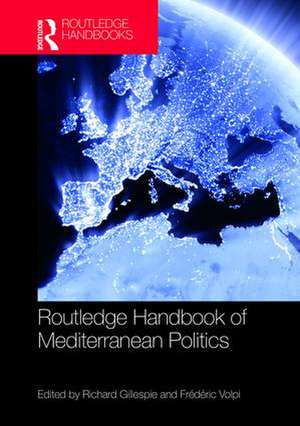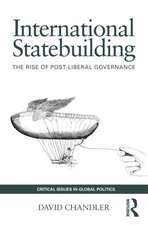Routledge Handbook of Mediterranean Politics
Editat de Richard Gillespie, Frédéric Volpien Limba Engleză Hardback – 21 aug 2017
This Handbook provides an overview of the political processes that shape the Mediterranean region in the contemporary context. It explores the issues of crucial importance to Mediterranean dynamics through a series of analytical sections that guide the reader towards a comprehensive understanding of the main regional interactions and trends.
The Handbook explores:
- the complex historical formation of the contemporary Mediterranean
- geopolitical perspectives
- issues around peace and conflict
- the political economy of the region
- the role of non-state actors and social movements
- societal and cultural trends.
| Toate formatele și edițiile | Preț | Express |
|---|---|---|
| Paperback (1) | 359.33 lei 43-57 zile | |
| Taylor & Francis – 12 dec 2019 | 359.33 lei 43-57 zile | |
| Hardback (1) | 1217.73 lei 43-57 zile | |
| Taylor & Francis – 21 aug 2017 | 1217.73 lei 43-57 zile |
Preț: 1217.73 lei
Preț vechi: 1635.12 lei
-26% Nou
Puncte Express: 1827
Preț estimativ în valută:
233.09€ • 253.27$ • 195.92£
233.09€ • 253.27$ • 195.92£
Carte tipărită la comandă
Livrare economică 21 aprilie-05 mai
Preluare comenzi: 021 569.72.76
Specificații
ISBN-13: 9781138903982
ISBN-10: 1138903981
Pagini: 432
Ilustrații: 16
Dimensiuni: 174 x 246 x 32 mm
Greutate: 0.91 kg
Ediția:1
Editura: Taylor & Francis
Colecția Routledge
Locul publicării:Oxford, United Kingdom
ISBN-10: 1138903981
Pagini: 432
Ilustrații: 16
Dimensiuni: 174 x 246 x 32 mm
Greutate: 0.91 kg
Ediția:1
Editura: Taylor & Francis
Colecția Routledge
Locul publicării:Oxford, United Kingdom
Public țintă
Postgraduate and UndergraduateCuprins
1. Introduction: The growing international relevance of Mediterranean politics, Richard Gillespie and Frederic Volpi 2. The historical construction of the Mediterranean, Dominic Fenech and Michelle Pace 3. Historical/geopolitical turning points in the modern Mediterranean: Cold War, Post Cold-War and Arab Spring, Francesco Cavatorta 4. Regionalism and the Mediterranean: Long history, odd partners, Federica Bicchi 5. Securing the Mediterranean, inventing the ‘Middle East’, Pinar Bilgin 6. From imperialism to failed liberal peace: How Europe contributed to MENA’s failing states system and how MENA blowback threatens Europe, Raymond Hinnebusch 7. A new era in Euro-Mediterranean relations, Richard Youngs Section II – geopolitical perspectives 8. EU member states’ representation and positioning and the north-south divide in Euro-Mediterranean affairs, Tobias Schumacher 9. The North-South divide: Southern perceptions of the Mediterranean, Yahia Zoubir 10. US Outlook on the Mediterranean 11. Israeli regional perspectives and the Mediterranean, Daniela Huber 12. Turkish regional perspectives and the Mediterranean, Bill Park Section III – peace and conflict 13. The Mediterranean Observes the World, the World Observes the Mediterranean: Conflict and Peace in the Mediterranean, Stephen Stetter 14. Military and Politics in the Mediterranean, Aurel Croissant and Tanja Eschenauer 15. Stalled conflicts in the Mediterranean, Neophytos Loizides 16. Insurgencies, terrorism, and political violence in the Mediterranean region, Krista E. Wiegand 17. Do regional organizations contribute to security? Perspectives on Euro-Mediterranean cooperation, Niklas Bremberg 18. Regime resilience and the Arab uprisings in the southern Mediterranean: Four emerging approaches for explaining authoritarian persistence, Matt Buehler and Amnah Ibraheem Section IV – political economy 19. Beyond state and market: Developmental strategies in the Arab world, Amr Adly 20. The political economy of energy in the Mediterranean, Gonzalo Escribano 21. Globalization and the Mediterranean, Patrick Holden 22. Minding development gaps in EU Mediterranean policies: A variegated neo-liberalization thesis? Karim Knio 23. Climate change, environmental degradation and renewable energy, Michael Mason 24. Politics and tourism in the Mediterranean region, Raoul Bianchi and Tom Selwyn Section V – non-state actors and social movements 25. Debates on civil society in the Mediterranean, Benoit Challand 26. Transnational advocacy networks and human rights activism, Laura Feliu 27. Islamist movements in the Mediterranean: Modernist Islam, Islamism, and Salafism, Roel Meijer 28. Women’s movements within Euro-Mediterranean Politics: Necessity of going beyond ‘the Arab woman’, Ali Bilgic 29. Youth activism and protest around the Mediterranean, Emma C. Murphy Section VI – societal and cultural trends 30. New media, activism, and the transformative Arab political landscape, Sahar Khamis 31. Digital communications and social networks: co-evolution of digital activism and repression during the Arab uprisings, Ben Wagner 32. Mediterranean migrants and refugees: Historical and political continuities and discontinuities, Sarah Wolff and Leilia Hadj-Abdou 33. Intercultural dialogue across the Mediterranean troubled waters: Challenges to the Anna Lindh Foundation, Stefania Panebianco
Notă biografică
Richard Gillespie is Professor of Politics at the University of Liverpool and was the founding editor of the journal Mediterranean Politics.
Frédéric Volpi is Senior Lecturer in International Politics at the School of International Relations at the University of Saint Andrews.
Frédéric Volpi is Senior Lecturer in International Politics at the School of International Relations at the University of Saint Andrews.
Descriere
This Handbook provides an overview of the political processes that shape the Mediterranean region in the contemporary context. It explores the issues of crucial importance to Mediterranean dynamics through a series of analytical sections that guide the reader towards a comprehensive understanding of the main regional interactions and trends.














